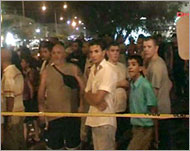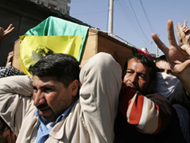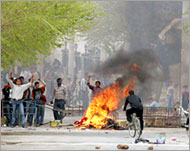Turks unhappy with Lebanon mission
With the decision to deploy hundreds of troops in Lebanon, Turks believe that Ankara has missed an opportunity to solve some pressing issues, such as the ongoing war in the country’s southeast, or to focus its efforts on national interests.

Although most citizens believe that Turkey cannot stay out of decisions that may shape the future of a peaceful Middle East, they also say that the situation could have been used to bargain with the US – Israel’s ally – over the pressing issue of dealing with the Kurdish rebel group, the Kurdistan Workers Party (PKK), which has bases in northern Iraq.
Hasan Unal, professor of international relations at Bilkent University in Ankara, told Aljazeera.net that Ankara had missed an opportunity.
“The government could have brought in two bills, one that would have allowed Turkey to deploy peacekeeping troops, and another that would have dealt with the issue of fighting the PKK in northern Iraq by demanding that the Turkish military have more support in this area … a missed opportunity to tackle the unrest in the southeast of the country.”
The Turkish military suffered its highest casualty rate ever in the space of one week this year when at least 16 members of the armed forces were killed by Kurdish rebels in July, and has lost at least six soldiers over the last six days.
At least 30,000 people have been killed in the long war between Turkey and the PKK, making it an emotional issue for the Turkish public.
 |
|
Tourists stand in shock after a |
In recent weeks, tourism, which generated $3.6 billion in the second-quarter of 2006, has taken a blow due to a spate of bombings in resort towns along Turkey’s Mediterranean coast that left three people dead and dozens injured, including 10 British tourists.
A Kurdish separatist group (TAK) claimed responsibility for the attacks.
Tourism is an important part of the Turkish economy and generated $18.1 billion in 2005. Visitor numbers have declined by 6.4 per cent so far in 2006.
Thousands of Turks took to the streets of the capital Ankara, on Tuesday, to protest against the deployment of Turkish troops, just hours before the decision was taken. Public opinion polls showed that up to 85 per cent of Turks were against the deployment.
“The interesting development this time around is that a large percentage of the protesters were supporters of the ruling Justice and Development party [AKP], which is a real turn around in Turkey. No one was happy with the government’s decision to send troops to Lebanon … no one,” Unal said.
Peacekeeping
Unal argues that sending troops to Lebanon could be a potential minefield for Turkey both on moral grounds and on technicalities.
With no formal ceasefire signed between Hezbollah and Israel, he says that Turkey is not protected as it was in past peacekeeping missions where the mandate was clearly stated by all involved and the mission was clear.
 |
|
Emotions run high as Turks and |
“In the case of Bosnia, it was different because there was a formal ceasefire and peace agreement signed by all parties and Turkish troops were part of a Nato force that had ground and air support. There is no such formality between Hezbollah and Israel; there is merely a lull in fighting.
“Turkey does not want to create a scar in the Middle East and it is the first time we have seen such an Arab force hold their own on the battlefield. There is some sentiment in the Middle East that this is just buying time for Israel, as they were not successful with their military objectives the first time around.”
Ali Yurtugul, a member of the European Parliament and adviser on migration, asylum and discrimination and on issues linked to Turkey, disagrees. He believes that this is a chance to heal old regional wounds that date back to Ottoman times.
“Turkey must be part of the peace process. Regional peace is crucial for the future peace of Turkey. Not engaging would be sending the wrong message. There are two to three million Arabs in Turkey. Historically Arab culture is well-integrated into Turkish culture; so, although there may be historical woes, we have a chance to be instrumental in the peace process,” he told Aljazeera.net.
Potential minefield
Scenes of weeping mothers burying their sons, victims of the Kurdish fight, have become a regular feature in the Turkish media and do not bode well for AKP popularity.
“Although the parliament can decide on the deployment of troops abroad, under the constitution, the president can still step in and call an emergency meeting of the security council, which would halt the deployment based on national interests” |
It is no secret that Recep Tayyip Erdogan, the Turkish prime minister and leader of the AKP, which has its roots in Islam, has his eyes set on becoming president in the 2007 elections.
With the Turkish military suffering such high casualties at home, the worry for Erdogan is that the Turkish public would not forgive him should casualties be incurred in Lebanon.
Yusuf Kanli, editor-in-chief of the Turkish Daily News, told Aljazeera.net: “Public opinion would not support such a move and should casualties arise from the Lebanon mission, it would hurt the reputation of the Turkish military.
“We do not need casualties at a time when we are fighting our own war.”
Although parliament has approved the deployment of troops, the implementation of the decision is yet to be carried out and no time has been set.
Ahmet Necdet Sezer, the Turkish president and a known secularist, must approve its implementation.
 |
|
Turkey’s southeast has been |
Sezer has been publicly against the deployment on the grounds of national interest.
Said Unal: “Although the parliament can decide on the deployment of troops abroad, under the constitution, the president can still step in and call an emergency meeting of the security council, which would halt the deployment based on national interests.
“This is the first time the president has been so opposed to the deployment of troops on a peacekeeping mission. The president is not a military man and has over-riding powers to overturn the government’s decision. What the president will do next remains to be seen.”